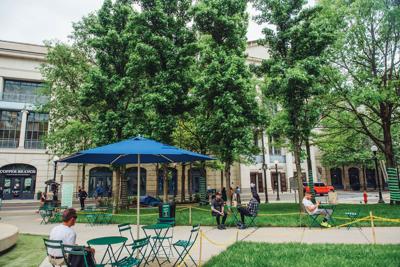Street View is a monthly column taking a close look at development-related issues affecting different neighborhoods throughout the city.
In July, Metro Council discussions about expanding downtown Nashville’s Central Business Improvement District struck a familiar theme.
BL2025-846, a bill from District 19 Councilmember Jacob Kupin, aims to combine the Central Business Improvement District (CBID) with the Gulch Business Improvement District (the GBID), creating one streamlined area managed by the Nashville Downtown Partnership. Both business improvement districts offer services like litter and trash removal, landscaping, district programming and safety patrols for property owners within their boundaries, funded by additional tax and a fee of 0.25 percent on certain retail transactions. The biggest concern for many locals was the CBID’s relationship with unhoused people downtown.
Councilmember Jacob Kupin sponsors ordinance to expand district, says it will generate an estimated $8 million in tax revenue
During the bill’s public comment period, NDP representatives and community partners talked about outreach efforts: helping local organizations give out meals and clothes and connecting people to supportive services. Isaiah Henderson, an outreach worker for NDP, said the organization helped him get back on his feet. “I stand here today not just as a supporter but as someone whose life was changed,” he said. “I was homeless, I was hopeless, and they found me.”
But a long line of people also came to speak in opposition of combining the CBID and the GBID, and they told a different story about the Nashville Downtown Partnership’s relationship to unhoused people. Many referenced NDP’s security contractor Solaren, which has allegedly forcibly removed people from downtown streets. District 6 resident Barbara Thomas called them a “shadow police force that targets our most vulnerable neighbors.”
Despite these comments, the BID merger passed 29-6, with a few amendments addressing community concerns. Now some organizations say the way Nashville Downtown Partnership interacts with vulnerable people needs to change.
“We have journeyed with folks throughout the years that always say the same thing — they are continually told to move along, they’ve been kicked awake by officers where they were sleeping, their belongings were pressure washed,” says India Pungarcher, associate director of advocacy at Open Table Nashville, a homeless outreach and advocacy organization. Pungarcher stresses that the people experiencing this behavior often aren’t violent or disruptive. “There’s not necessarily a precipitating event. It’s just there are people in an area that is inconvenient for tourists and the businesses downtown.”
Solaren has been the subject of a few recent controversies. In May, an anonymous whistleblower told WSMV that Solaren instructed employees to arrest unhoused people but leave rowdy tourists alone. In March, the group went before a judge for having their security guards wear police badges. And in 2024, Solaren arrested 10 people after new federal laws made camping on state property a felony.
Kupin, whose district includes downtown Nashville, sponsored the legislation combining the BIDs. He tells the Scene he took action after the felony anti-camping arrests. “To me, that was indicative of a problem and we solved it, because we shouldn’t be felony arresting people for trying to exist,” he says.
Overall, Kupin says security downtown isn’t about targeting a specific group, but instead targeting behaviors that make people feel unsafe. “I try to separate someone’s housing status from their behavior,” he says.
Downtown serves as a hub for many resources and also connects many of Nashville’s bus routes. This includes temp services with pickup spots and offices downtown. “There are a lot of people who work downtown who are experiencing homelessness,” says Pungarcher. Many of these people work in construction, she says: “They’re quite literally building the buildings downtown, and then they have nowhere to sleep at night.”
According to Open Table, making downtown better for everyone isn’t a problem that can be solved by more policing. “We’re spending millions of dollars trying to police our way out of very deep economic and social issues,” Pungarcher says.
In an email to the Scene, Nashville Downtown Partnership’s marketing and communications manager Alexis Bell highlights NDP’s overall efforts to keep downtown “clean, safe, active and attractive through clean and safe services, marketing and communications and economic development.”
NDP does invest in outreach programs. Bell highlights their outreach team, “a four-person team who engage daily with individuals to connect them with a variety of services and resources (voluntary rehabilitation, temporary or permanent housing and employment opportunities) with more than 6,000 connections in 2024 and the first third of 2025.” NDP did not respond to the Scene’s question about whether they would invest some of their funding in affordable housing in the future.
Nashville’s 2025 point-in-time count — an annual one-night estimate of people experiencing homelessness — put the number at 2,180 people on Jan. 23. This was up 4.1 percent since January 2024. While the city has taken steps to offer more supportive housing, nonprofits have also criticized Metro’s Office of Homeless Services for a lack of transparency. And overall, people will continue to experience housing insecurity if housing isn’t affordable.
The Office of Homeless Services is at the center of shaky citywide efforts as detractors call for director to be ousted
“We have to be honest as a city,” Pungarcher says. “We don’t have enough resources … so just bringing an outreach worker online or having their presence can only go so far if there aren’t housing units or resources on the other end of that outreach worker interaction to connect people to.”
The Nashville Banner previously reported that NDP’s contract with Solaren is up for renewal in April of next year. While NDP did not respond to the Scene’s question about whether they would renew that contract, NDP chief operating officer Ben Simpson told the Banner in March that it’s not out of the question that they would consider other providers.
A number of amendments to Kupin’s bill addressed community feedback, including more financial transparency and an established grievance process for people interacting with security personnel. District 7 Councilmember Emily Benedict proposed an amendment that would set aside parts of NDP’s budget for an affordable housing fund, but that amendment did not make it into the final version of the bill.
Kupin says nearly all the constituents he spoke to were “happy and supportive” with the efforts of the bid, but he also recognizes that there’s still work to do.
“Anyone who lives in my district is a constituent, whether they have a home or not,” says Kupin. “I think it’s really important that the message gets out that I’m not just thinking about the rich business owners. To me, [downtown] is about the unhoused individuals, the people that live there, and the people that work there. We are working really hard to take care of everybody, and that work will continue.”
In the meantime, more resources can’t come soon enough. “Many of us are worried that we’re on the precipice of a new wave of mass homelessness and mass evictions,” Pungarcher says. “Our friends on the streets are feeling that.”







